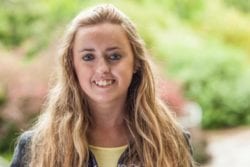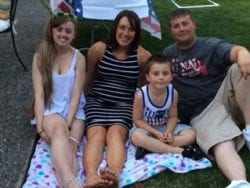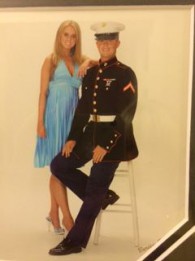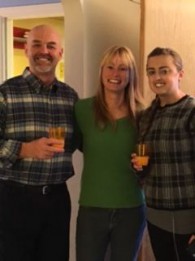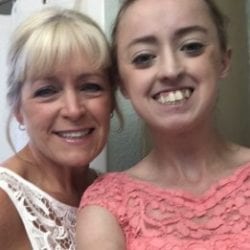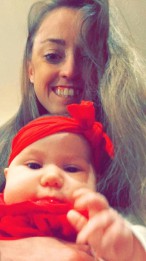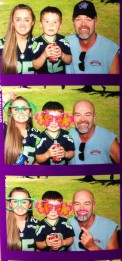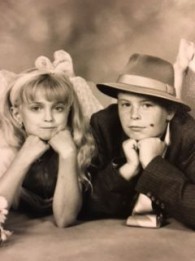Allyson Meredith Stone
September 27, 1990 - February 6, 2017
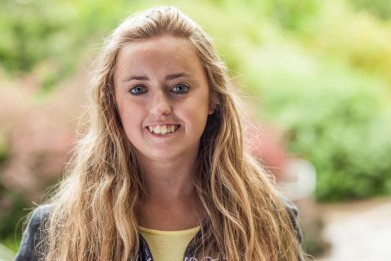
Obituary
MEMBER OF UW HOOPS FAMILY MADE EVERYONE BETTER AT LIFE
Larry Stone Times columnist
When she played basketball, which she did against all odds and with unbridled passion, Allyson Stone’s particular skill was making teammates better. Everyone loved passing to her, coaches came to realize, because they knew they’d get the ball back.
Now when friends and loved ones look back on Allyson’s life, they talk almost in one voice about how her example, her unwavering spirit in the face of the most daunting challenges imaginable, made them better people. Better at life.
But, oh, how they wish they could bring her back.
Allyson died Feb. 6, at age 26, ending a fierce, courageous battle against the ravages of systemic scleroderma, a rare disease that eventually caused her lungs to give out, but only after she beat it back time after time for nearly 20 years.
It’s fitting I write this column on Valentine’s Day, because even with the tragic nature, it’s a love story. A family’s love. A girl’s love of basketball. Especially, her love of a particular basketball team, the University of Washington women’s squad of the early 2000s. And ultimately, the love that team gave her right back.
“The impact she made on us was just as important as the impact we made on her,’’ said Loree Payne, one of the UW players that adopted the preteen Allyson as part of the Husky family and made sure she never left.
Allyson’s dad, Larry Stone, likes to say basketball saved her life (let me say here that although we share a name, Larry Stone is not related; we have, however, been acquainted for nearly the entire breadth of Allyson’s battle).
More specifically, it was the Huskies’ players of that era, as initially galvanized by assistant coach Sunny Smallwood, that helped Allyson through a brutal stretch when chemotherapy sessions at Children’s Hospital were a regular part of her life. When Allyson was diagnosed with scleroderma at age 9, with 30 percent of her lung capacity already gone, her life expectancy was projected at five years. Allyson would have none of it.
“She was just one determined person,’’ recalled Allyson’s brother, Billy. “Whatever she put her mind to, she didn’t quit until she either failed with her best effort, or achieved it.”
That went on the basketball court, where Allyson played year-round AAU ball starting from the sixth grade, through her days as a varsity player at Kennedy High School. At first, she could barely make it up and down the court without gasping for breath.
By seventh grade, Allyson could run a full game without stopping, and people were amazed when they found out she was doing it all with diminished lung capacity. They had no clue, which is exactly how Allyson wanted it. She hated to be fussed over, or treated gingerly. Stone has no doubt that the exertion helped her fight off the rare, chronic and often progressive autoimmune disease.
“I liked the motion of the game,’’ Allyson told The Seattle Times’ Steve Kelley, who profiled her in 2002 and 2005. “It was so intense and so hard, and it looked like something that would be so much fun to play. I fell in love with it the first time I saw it.”
She fell hard for the Huskies, in particular, and when Allyson was struggling with chemo back in 2002, Larry Stone called up Smallwood to ask if it was possible to have a UW player come by to say hello. Smallwood said she’d take care of it, even if she had to come herself. Instead, she brought Payne and sisters Giuliana and Gioconda Mendiola — “the three players Allyson would have picked if she could have chosen any three,’’ Stone said.
When the Huskies’ contingent walked into the hospital room, Allyson had tears in her eyes. The IV had just gone in her hand, and blood was trickling out. I’ll let the other Larry Stone, who was in the room, tell it far more eloquently than I ever could:
“Allyson’s jaw dropped, she wiped the tears off, her eyes got big, and Sunny said, ‘Hi, I’m Sunny. We got a call from the hospital you were bleeding purple and gold, and I thought I’d better get down here.’ That was the very last time Allyson ever cried at a chemo treatment.”
Here are Allyson’s own words, to Kelley in 2002, about what it meant to have the Husky players hang out with her during chemo: “They take the scary part out of it, and they put the fun part in it.”
Those Husky players, heroically, never missed one of her treatments. There was just something about this girl and her uncomplaining, ever-cheerful demeanor that worked its way into hearts.
“We sort of adopted her,’’ recalled Smallwood, now an assistant coach at Arizona.
“She was a part of what we did and who we were,’’ added Payne, now the women’s coach at the University of Puget Sound. “It was not something we ‘had’ to do. Al became part of our Husky family. She never showed any pessimistic attitude with everything she was facing. She was always upbeat, happy.”
The Huskies invited Allyson to be one of their ball girls as a 10th-birthday present. When star Kayla Burt, another regular visitor, suffered a heart attack, Allyson was the first nonplayer to visit her in the hospital. Through her own hoops career, various Huskies frequently would come out to watch Allyson play.
“Those players stayed in contact all the way through high school,’’ Stone said. “They took a kid that was supposed to be dead in five years and extended her life.”
Stone is especially proud of the fact Allyson never let her illness define her life. She had much more in mind. After high school, Allyson contemplated walking on to play at Washington, Washington State or UPS, but it never did happen, even though basketball, particularly Husky basketball, remained a huge part of her life until the end. This past Christmas, she gave her 1-year-old niece, Addison (named in Allyson’s honor), a tiny hoop.
Her dad calls her “an old soul.” Allyson loved to travel, had a particular affinity for Humphrey Bogart movies (“Casablanca” was her favorite) and devoured the Harry Potter books. Allyson got her AA degree and had plans to take the MCAT exam next spring. She wanted to become a doctor and work for Doctors Without Borders.
But last March, after years of stability, Allyson’s health abruptly took a bad turn when she contracted pneumonia and a lung infection. She returned home after a week in a hospital but needed full-time oxygen. Hospitalized again in August, Allyson was told she might need a lung transplant, to which she replied, “I’m attached to my lungs.” Allyson vowed to get them better, as she had always done before.
This time, however, it wasn’t to be. On Jan. 16, she was taken to ICU at Good Samaritan Hospital in Puyallup. This time, Allyson agreed to a lung transplant but never recovered enough to be transported to UC San Francisco Medical Center for the procedure. Allyson Stone died 22 days after she entered the hospital — one final nod to basketball and the Huskies. Allyson always wore No. 22 — Loree Payne’s number.
“She kept amazing her doctors, and honestly did that to the end with the recoveries she made,’’ Stone said. “They had never seen anyone with such fight.”
In her final days, while under heavy sedation, Allyson awoke and asked if her niece, Addison, was OK.
“She was a good person who thought of everyone ahead of herself, even in her final moments,’’ Billy said of his sister. “That’s important for people to know.”
And her dad wants people to know, among other things, what a battler she was, on and off the court.
“The people in basketball who didn’t sell her short, they knew,’’ Larry Stone said. “They got the full deal. Like the old saying, the greatest thing you can give anyone was a chance. Not a lot did, but those who did were glad. She was amazing.”

